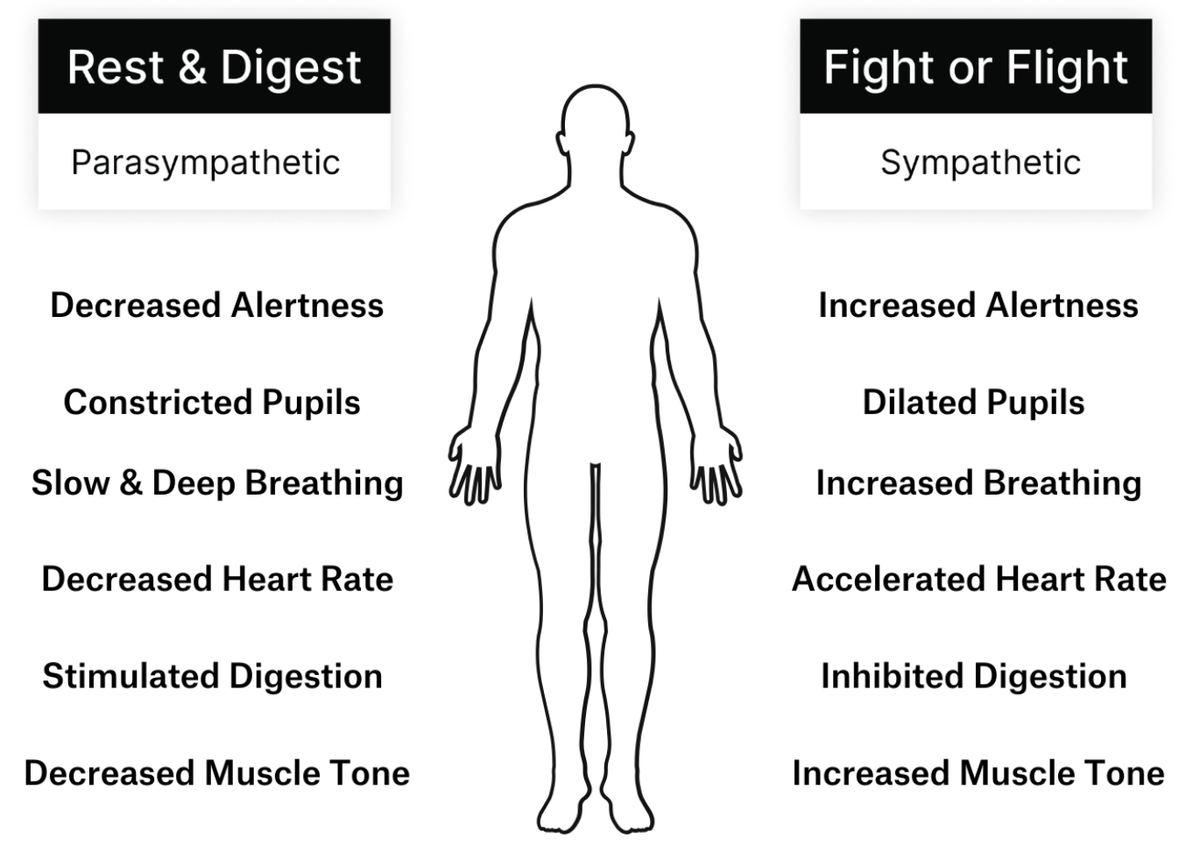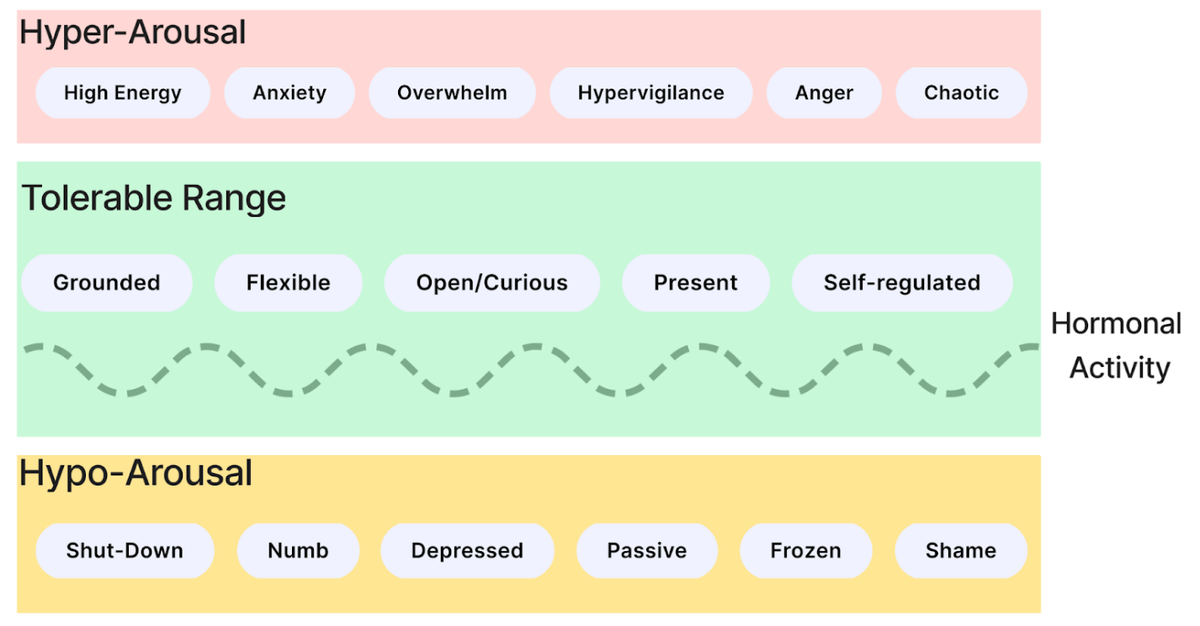# Master Your Mind: Navigating the Nervous System and Chronic Stress
! [ rw-book-cover] (https://cdn.sanity.io/images/pghoxh0e/production/f9c3ca7bcb8f5a7601fb56c20d3a1a2302116f2f-1418x286.png?w=1200&fit=max&auto=format)
URL: https://www.reforge.com/guides/master-your-mind-navigating-the-nervous-system-and-chronic-stress
Author: Andrew Johns

## AI-Generated Summary
The book "Master Your Mind" explains how our nervous system struggles to cope with modern psychological stress, which is different from the immediate threats faced by our ancestors. It introduces the concept of a "Window of Tolerance," where we can handle stress effectively without becoming overwhelmed. The author emphasizes the importance of actively managing our mental state and nervous system to improve our well-being in today's fast-paced world.
## Highlights
> relentless ([View Highlight](https://read.readwise.io/read/01ja3hp309mbtkbq2f69raytz0))
- Note: relentless (adjective): continuous; unyielding 📈💪
> the acceptable “Window of Tolerance.” This psychological benchmark represents a state where one can handle and thrive under stress without falling into hyper-arousal (overwhelm) or hypo-arousal (withdrawal). Mastering this concept is vital for applying what you learn to your daily life. ([View Highlight](https://read.readwise.io/read/01ja3htaw453bjx3vzvxtkjapt))
> **In nature, stress signals a transient crisis; in human society, concerns about work, finances, relationships, and a never-ending stream of digital notifications perpetually activate our fight-or-flight response beyond its intended use**. This chronic activation underlies the surge in stress-related illnesses today, both physical and mental. ([View Highlight](https://read.readwise.io/read/01ja3j0hrvmr57rf0nkmcmcspb))
> myriad ([View Highlight](https://read.readwise.io/read/01ja3j9aptj6cgfpwdyvz7bsp5))
- Note: myriad (adjective): countless; a great number of 🧠🔗
> The mind is not merely a product of neuronal activity but also a confluence of emotional, psychological, and social dimensions that enrich the human experience. ([View Highlight](https://read.readwise.io/read/01ja3jb16qswc667dg5qf8s1aw))
> **In summary, think of the nervous system as the body’s hardware transmitting information and the mind as the software interpreting that information**. ([View Highlight](https://read.readwise.io/read/01ja3jc27gjxn5hn8916tbdj2y))
> Through practices like meditation, deep breathing, and yoga, we can engage the parasympathetic nervous system—the body's tranquilizer—which counters the stress-induced activations of the sympathetic nervous system. This influence helps slow our heart rate, lower blood pressure, and calm the mind. By regularly engaging in these practices, we learn not just to react to our environment but to interact with and modulate our internal responses, mastering a significant portion of our physiological experience. ([View Highlight](https://read.readwise.io/read/01ja3jfpszjfwfqf129yvag238))
> The below diagram shows the basic function of the two major components of the nervous system – the sympathetic and parasympathetic systems.
>  ([View Highlight](https://read.readwise.io/read/01ja3jgm5fvbqdjgffdqjtt2ef))
> Your goal is to adopt a lifestyle of habits that activate the rest-and-digest system, allowing you to recover from each day’s work and maintain long-term emotional resilienc ([View Highlight](https://read.readwise.io/read/01ja3jhkn5ntz7vdtx2v2qxn3j))
> Much like a software engineer programs a computer, our environment inputs new data into our minds and nervous systems, embedding itself into our behavioral patterns as humans. ([View Highlight](https://read.readwise.io/read/01ja3nze1kq82sdaz7hyhdmp0w))
> soaring ([View Highlight](https://read.readwise.io/read/01ja3p0ksgk7xjgh3efz8ya0fr))
- Note: soaring (adjective): rapidly increasing; rising dramatically 📈🦅
> **Social Interactions:** our emotional well-being and mental health are significantly influenced by our relationships with family, friends, and colleagues. ([View Highlight](https://read.readwise.io/read/01ja3p54kdbvgk65ehryax92ph))
> **Physical Environment:** noise, air quality, and general living conditions impact our emotional state. Conversely, natural settings like parks or forests can soothe and enhance cognitive function however we spend less time in natural environments today than prior generations. ([View Highlight](https://read.readwise.io/read/01ja3p6w9d2gh97h4z55be6k6h))
> **Diet and Nutrition:** the nutrients we consume directly influence brain activity, playing critical roles in cognitive health and emotional management. ([View Highlight](https://read.readwise.io/read/01ja3p79jchr1wrfs78t9wxmmf))
> **Exercise and Physical Activity:** regular activity promotes neural growth, decreases inflammation, and improves mood by regulating neurotransmitters and releasing endorphins, which act as natural mood elevators. A busy work life often affords less for physical activity. ([View Highlight](https://read.readwise.io/read/01ja3p7nqydg480fmqszg1pmxk))
> **Sleep:** the quality and amount of sleep are vital for learning, memory retention, and emotional balance. Late night emails can wait, yet we don’t allow them to. ([View Highlight](https://read.readwise.io/read/01ja3p80sj8dw6qgfx6avgn7k4))
> **Stress and Trauma:** trauma can induce alterations in brain chemistry and structure, affecting mood, anxiety, and the likelihood of developing mental health issues. This is especially true with childhood trauma. ([View Highlight](https://read.readwise.io/read/01ja3p8d0p0rvvdx3sjv85msnj))
> **Media and Information Exposure:** the nature and volume of our media consumption, including news and social media, shape our thoughts, emotions, and stress levels. An overload of negative content can lead to detrimental psychological effects. ([View Highlight](https://read.readwise.io/read/01ja3p97c32yxdfc05q6yah7sp))
> **Cultural and Societal Influences:** cultural values, societal norms, and collective experiences mold our beliefs, behaviors, and particular stressors. Some grow up in cultures that view mental health as a boogy man – it’s made up. That only adds to our psychological stress. ([View Highlight](https://read.readwise.io/read/01ja3pa76g2852kn76cbt6jc1a))
> **Climate and Weather:** seasonal changes and weather conditions can sway our mood and energy levels, evident in disorders like seasonal affective disorder (SAD) and weather-linked mood fluctuations in conditions like bipolar disorder. ([View Highlight](https://read.readwise.io/read/01ja3pavjqfvkay4mhx20971an))
> **Substance Use and Exposure to Toxins:** consumption of substances like drugs and alcohol, as well as exposure to environmental toxins, can significantly alter brain chemistry, mood, cognitive functions, and overall health. It’s easier than ever to find booze or drugs to numb out on. ([View Highlight](https://read.readwise.io/read/01ja3pbdtxh348zrkgmgd3jq3q))
> **Consistent Practice and Learning:** the brain evolves through repeated exposure to new information and skills, adapting with each iteration. ([View Highlight](https://read.readwise.io/read/01ja3pd709wpghqsdsm1nkfc8p))
> **Mindful Attention and Awareness:** focused attention and mindfulness are essential for guiding neuroplasticity. We steer our brain's adaptability toward desired changes by intentionally directing our attention toward particular actions, thoughts, and feelings. ([View Highlight](https://read.readwise.io/read/01ja3pdedeckqxt13dg90anfd9))
> **Emotional Engagement:** emotional experiences profoundly influence neuroplasticity. Positive emotions such as joy, curiosity, and love stimulate neurotransmitters like dopamine, which enhance the brain's capacity for learning and memory. Conversely, negative emotions can impede this process. ([View Highlight](https://read.readwise.io/read/01ja3pdzpd88czt87289yem612))
> **Challenging and Novel Experiences:** engaging the brain with new and challenging scenarios promotes neuroplasticity, compelling it to develop new neural pathways and adapt. ([View Highlight](https://read.readwise.io/read/01ja71f0m2e7tmkk1eh91t93as))
> **Physical Exercise and Healthy Lifestyle:** regular physical activity boosts blood flow to the brain, supports the generation of new neurons, and improves the brain's overall adaptability. ([View Highlight](https://read.readwise.io/read/01ja71fwms3bwy70v20vqt3jcy))
> demonstrating how intensive training in spatial navigation can lead to significant neuroplastic changes, enlarging and reorganizing this brain region. ([source](https://www.pnas.org/doi/full/10.1073/pnas.070039597)) ([View Highlight](https://read.readwise.io/read/01ja71jdpsy6107n9y9wqpmf3d))
> This intricate interplay between the mind, the nervous system, and the external environment underscores their mutual influence. The nervous system, comprising the brain, spinal cord, neurons, synapses, and neurotransmitters, serves as the body's communication network. Meanwhile, the mind, which includes mental processes like consciousness, perception, and cognition, interprets and responds to this information, forming a feedback loop that helps navigate life's challenges. ([View Highlight](https://read.readwise.io/read/01ja71mwf0a1dz9vs7e7kgn4s5))
> Dr. Daniel Siegel, a clinical professor of psychiatry at UCLA and a pioneer in interpersonal neurobiology, introduced the concept of the Window of Tolerance. It describes a psychological state where an individual can effectively manage and thrive amid stress and challenges without becoming overly reactive or withdrawn. ([View Highlight](https://read.readwise.io/read/01ja71p3xzm56vzar1ygs0p257))
> **The Window of Tolerance represents a balance between these systems, ensuring our reactions to stress are neither too intense nor too subdued.** **Burnout prevention happens within the Window of Tolerance.**
>  ([View Highlight](https://read.readwise.io/read/01ja71r3ts2y7syemrgdjcy5jh))
> “During an emergency, it makes sense that your body halts long-term, expensive building projects. If a tornado is bearing down on the house, this isn’t the day to repaint the garage. Hold off on the long-term projects until you know there is a long term. ([View Highlight](https://read.readwise.io/read/01ja71vbz1s3q3v25hncehanyv))
> “Allostatic load” is another term you should know. It represents the total impact of stress on your body over time, much like a running tally. This concept helps explain how repeated stress responses can gradually damage your body's systems, leading to various health problems. ([View Highlight](https://read.readwise.io/read/01ja71we022jy8dm484gg4qqmk))
> The constant flood of stress hormones can erode many of our body’s vital health systems, leading to chronic illness such as depression, diabetes, digestive issues such as irritable bowel syndrome, degradation in sexual function and fertility, and even various forms of cancer. ([View Highlight](https://read.readwise.io/read/01ja71zr3e002wzz9f6q96xp2w))
> Today's stress-related ailments stem from our reliance on a system originally designed for immediate physical reactions—the fight-or-flight response. However, in modern settings, this system is frequently triggered by ongoing concerns such as financial pressures, relationship conflicts, career progression, constant emails, and other psychological triggers, keeping the nervous system active far longer than intended. ([View Highlight](https://read.readwise.io/read/01ja725bm50r8f719jz2c8fxkr))
> The nervous system acts as the body’s biological hardware, transmitting information, while the mind is the software that processes and interprets this data. Together, they function as prediction engines, forecasting future occurrences based on past experiences. If we consistently expose our minds to psychological stressors, we risk developing a chronically stressed nervous system and a cascade of health issues downstream from that. ([View Highlight](https://read.readwise.io/read/01ja725qhc8gdn9aq9pmtf6ft1))
> However, we are flexible with our previous programming. Our mind and nervous system possess plasticity, which can adapt and change over time in response to new experiences. This adaptability can help mitigate the impact of stress when we repeatedly expose ourselves to new inputs that condition our nervous system toward rest & digest mode. ([View Highlight](https://read.readwise.io/read/01ja725y52hnrhpfsy9nebmvj3))
> We each have a "Window of Tolerance," a concept that describes the ideal level of nervous system arousal where we can operate most effectively. Numerous external factors, including diet, exercise, sleep, social interactions, substance use, and cultural influences, can affect this tolerance window. ([View Highlight](https://read.readwise.io/read/01ja7266p8wfwk07bz69rs8zdv))